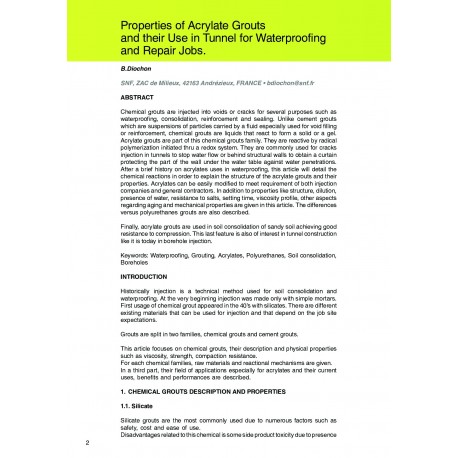Cart
0
0
No document
0,00 €
Total
Document successfully added to your shopping cart
Quantity
Total
There are 0 items in your cart.
There is 1 item in your cart.
Total documents
Total shipping
To be determined
Total
Search & filter
Search for a publication
Search & filter
Properties of Acrylate Grouts and their Use in Tunnel for Waterproofing and Repair Jobs.
1157_properties_of_acrylate_grou
Chemical grouts are injected into voids or cracks for several purposes such as waterproofing, consolidation, reinforcement and sealing. Unlike cement grouts which are suspensions of particles carried by a fluid especially used for void filling or reinforcement, chemical grouts are liquids that react to form a solid or a gel. Acrylate grouts are part of this chemical grouts family. They are reactive by radical polymerization initiated thru a redox system. They are commonly used for cracks injection in tunnels to stop water flow or behind structural walls to obtain a curtain protecting the part of the wall under the water table against water penetrations. After a brief history on acrylates uses in waterproofing, this article will detail the chemical reactions in order to explain the structure of the acrylate grouts and their properties. Acrylates can be easily modified to meet requirement of both injection companies and general contractors. In addition to properties like structure, dilution, presence of water, resistance to salts, setting time, viscosity profile, other aspects regarding aging and mechanical properties are given in this article. The differences versus polyurethanes grouts are also described.Finally, acrylate grouts are used in soil consolidation of sandy soil achieving good resistance to compression.




